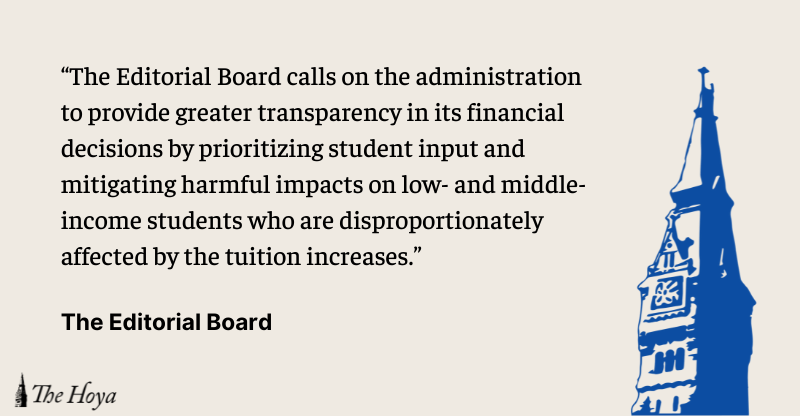For a university that has recently been accused of strategically reducing its financial aid to low-income and middle-income students, Georgetown should be taking particular care in prioritizing and alleviating the financial burdens of their students.
Yet, in a Feb. 14 email to undergraduate students, Georgetown University announced that it would increase tuition for the upcoming academic year 3.5%, from $59,784 to $61,872. The university specifically cites recent national inflationary trends as a major factor in this decision, as well as costs from the COVID-19 pandemic.
This hike follows a disturbingly long trend of tuition increases, creating an even larger bill for students attending one of the most expensive private universities in the United States. Last year, the university increased its tuition 4%, and 3.5% the year before. Though most private universities annually increase their tuition, Georgetown’s tuition increase in 2021 was nearly double the national average.
The Editorial Board calls on the administration to provide greater transparency in its financial decisions by prioritizing student input and mitigating harmful impacts on low- and middle-income students who are disproportionately affected by the tuition increases.
Tuition prices primarily affect students, but the student body has little to no input in the process of deciding these increases. According to the university, many factors are taken into account before deciding on the final price.
“There are a variety of factors taken into consideration in setting tuition rates, including the costs of delivering a high-quality education, available sources of financial aid, projected costs for competitive faculty and staff salaries, student services, technology upgrades, maintenance and improvements to campus facilities, and national price inflation and cost of goods,” a university spokesperson told The Hoya.
The university’s statement glaringly lacks any direct input from undergraduate and graduate students. In fact, almost every university across the country lacks student representation in this process. Georgetown’s tuition has increased for at least the past nine years, and they will almost certainly continue to increase. In light of that, the people directly affected, who bear the brunt of the price hikes, should –– at the very least –– be included in the process before a decision is made.
Moreover, according to the university’s financial disclosures from fiscal year 2021, approximately 49% of its $1.7 billion revenue consists of student tuition, with the rest coming from grants, contributions and other sources.
While students continue to incur massive amounts of debt to pay for their education, the university continues to pay its top administration officials obscene salaries. According to a 2019 tax filing which lists the annual salaries of top figures at the university, Georgetown University President John J. DeGioia (CAS ’79, GRD ’95) earned $1.3 million, men’s basketball Head Coach Patrick Ewing earned $3.4 million, with other high-ranking figures like Provost Robert Groves earning upwards of $800,000 per year.
Rather than continuing tuition increases, the university must lower the salaries of its top executives and reinvest this money to curb the amount of debt students take on to pay for their education.
Tuition increases often deter low-income students from applying to more selective schools, for fear of graduating with high sums of debt. By increasing its tuition, the university creates and perpetuates an unrepresentative campus environment that excludes low-income students who have much to offer the university.
For current low-income students, these increases could create an even more difficult campus environment to live in, particularly for students who rely on outside scholarships, of which the university only removes $3,000 maximum from a student’s tuition.
In a Feb. 18 article in The Hoya, Georgetown University Student Association (GUSA) President Nile Blass (COL ’22) echoed these concerns.
“It’s going to negatively impact a lot of students who have outside scholarships because of the way Georgetown calculates aid,” Blass told The Hoya. “This just seems like creating a bigger chasm between how students, especially those with aid, are going to be able to meaningfully support themselves and to maintain some level of stability in the academic environment.”
When considering recent trends of inflation and similar increases at other competitive universities, it is understandable that the university feels the need to continually increase its cost of tuition. It is also important to note that the university will dedicate $260 million to financial aid out of its total tuition intake, a 13% increase from last year’s financial aid investments.
At a notoriously expensive university, however, the administration should prioritize the alleviation of students’ financial burdens to ensure that they do not become even more entrenched in the already-exorbitant student debt crisis.
In evaluating tuition increases, the university must include student input by actively working with student representatives to limit the effects of financial decisions on low-income and working-class students. Additionally, they should seek other sources of income, shifting away from excessive reliance on tuition, and instead look to endowments, donations and potentially even the salaries of top executives as a means of funding. Committing to the financial needs of students shouldn’t be a big ask; it should be the bare minimum.
The Hoya’s editorial board is composed of six students and is chaired by the opinion editors. Editorials reflect only the beliefs of a majority of the board and are not representative of The Hoya or any individual member of the board.









